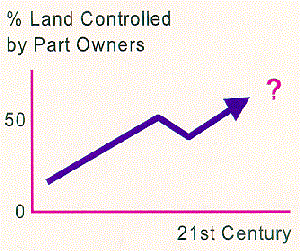


On family farms, individual operations and partnerships predominate. National corporate farms have the highest average farm sales, however. The average acreage is also greatest on corporate farms at 1,672 acres in 1993, compared with 850 acres for partnerships and 362 for individual operations.
In the face of growing expansion and economic instability, family farmers have had to develop a wide variety of organizations and adaptations to remain viable.
Incorporation is one such method. Don and Janet Hawk run an incorporated turkey and grain farm outside of Danville. This is currently a good system for them because it provides significant tax advantages, and in the future, it will be beneficial as an aid in transferring the farm to the next generation.
The farm as a corporation is a tax entity unto itself. This provides security, as well as opportunities to save money. Don Hawk explains:
To make it different from just Don and Janet farming, we work for the corporation. What it amounts to is that the corporation is a tax entity of its own, and then Don and Janet have their own checkbook, you might say. So, if I draw a wage from the corporation, it's an expense for them, so they get it as a deduction. Also, we own the real estate, but rent part of it to the corporation. So it's a form of income for us, it's an expense for the corporation.The Hawks have three children currently living on the farm, and they also hire a college student to work with them during the summer. If any of the children decide they would like to relieve some of the farm work from Don and Janet, this would allow them to work on expanding their side operation of raising hydroponic tomatoes, which are not part of the corporation. In this case, they would be able to use the tomatoes as income and therefore stop drawing wages from the corporation. This would leave the farm more financially secure for the next generation.
Partnerships work in a similar fashion. It can pay wages
and provide a
formal organization to pass on to the next generation, but it is not a
seperate tax entity. On an incorporated farm, profit and loss
are
taken by the corporation, not by the direct owners. On the other hand, losses
in a partnership are taken by the partners themselves. By the same token,
if the farm profits, the partners divide it among themselves.


 E-Mail The Family Farm Project
E-Mail The Family Farm Project